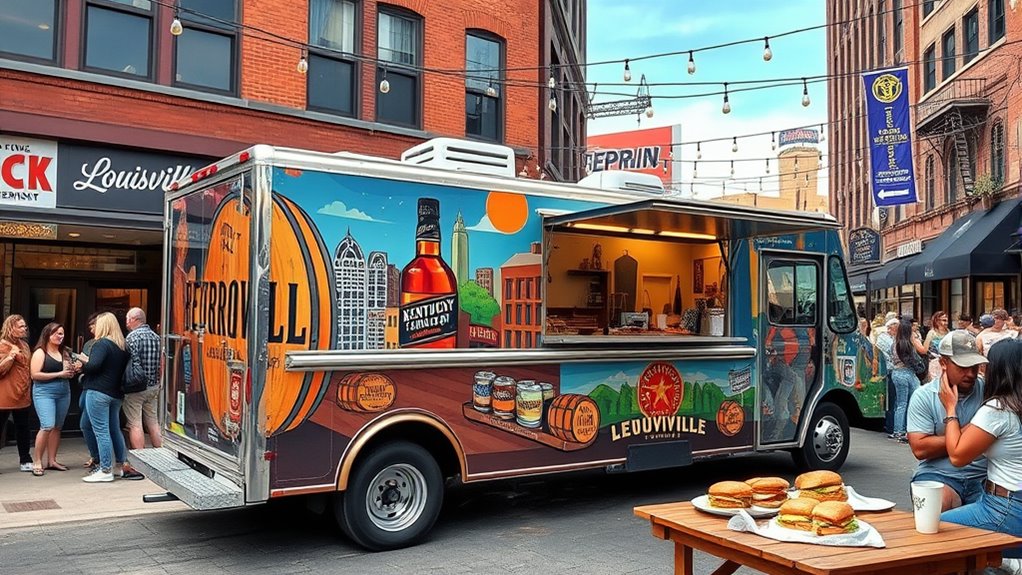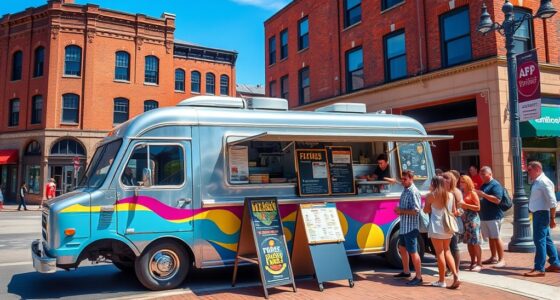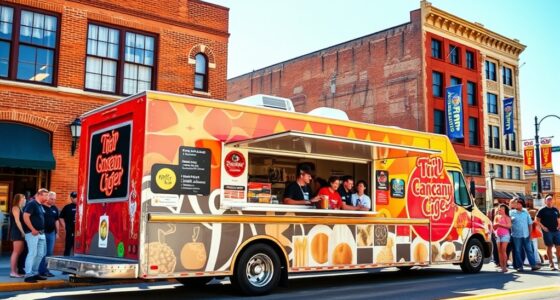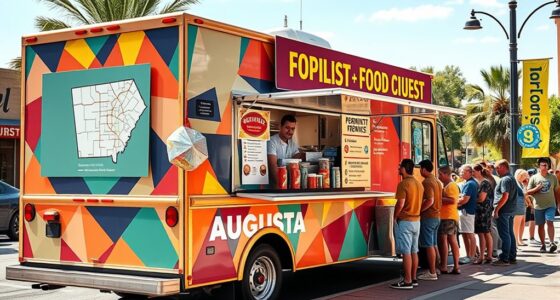To start a food truck in Louisville, you’ll need to obtain a Mobile Food Vendor License and complete a Kentucky Food Handler Card. Budget initial costs around $7,000–$25,000 for permits, equipment, and inventory, with ongoing expenses like permits, insurance, and maintenance. Choose busy locations like downtown or events and make certain your menu meets health standards. Consistent marketing and community involvement boost your success. Keep exploring for detailed steps to help you get started smoothly.
Key Takeaways
- Obtain necessary permits from Louisville Metro Health Department, including a Mobile Food Vendor License and food handler certification.
- Budget for initial costs like truck purchase ($30,000–$90,000), equipment, permits ($7,000–$25,000), and inventory ($1,300–$5,300).
- Choose high-traffic locations such as downtown, event venues, and food truck parks, ensuring zoning compliance and permits.
- Develop an approved menu with detailed ingredients, focus on hazard-prone foods, and follow strict food safety and storage standards.
- Engage in community events, partner with local businesses, utilize social media, and participate in festivals for effective marketing.
Navigating Permits and Legal Requirements in Louisville
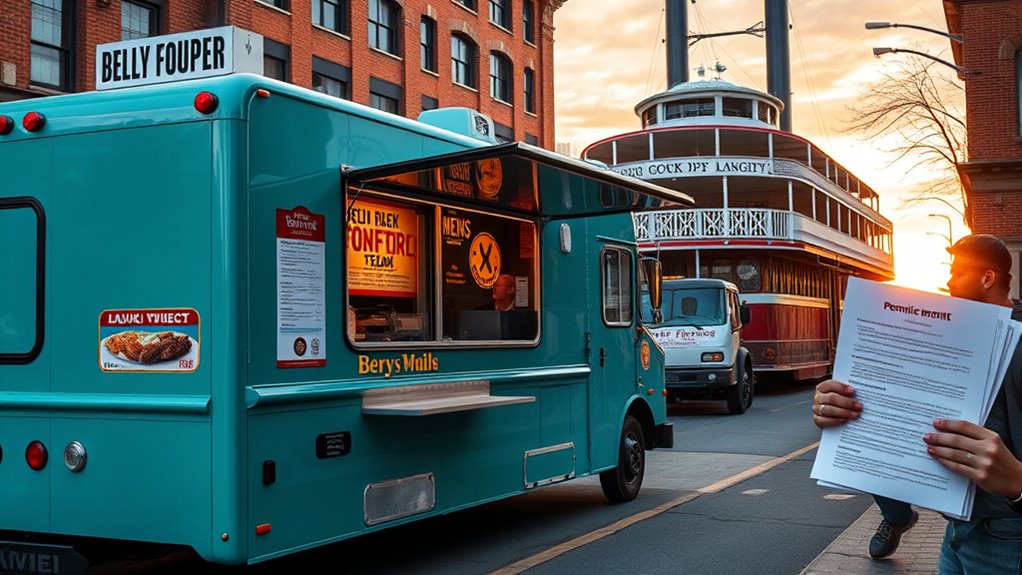
Are you ready to hit the streets with your food truck in Louisville? First, you need a Mobile Food Vendor License from the Louisville Metro Health Department. You’ll submit an application and pass an initial health inspection before opening. Daily cleaning and servicing are required to keep your truck compliant. Your menu must be approved by health officials, and permits need annual renewal. You also need at least one certified food manager on board, who has completed a recognized food safety course like the Kentucky Food Handler Card. To operate legally, apply for a Louisville-specific Food Truck & Mobile Vending Permit, costing around $200 plus $50 for a Vendor ID. Your truck must display permits, pass plumbing inspections, and include essentials like a handwashing station and fire extinguisher. Additional permits may be required depending on your specific location within Louisville to ensure full compliance with all local regulations. Additionally, understanding mobile food vendor regulations can help you stay ahead of compliance requirements and avoid potential penalties.
Budgeting for Startup and Ongoing Expenses

When planning your food truck, you need to carefully consider both your initial investment and ongoing costs. From truck purchase and equipment to daily supplies and permits, every expense adds up quickly. Understanding these budget components helps make certain your business stays financially healthy from the start. Start-up costs, such as purchasing or leasing your truck and outfitting it with necessary equipment, can vary significantly depending on your choices, so budgeting accurately is crucial to avoid unexpected expenses. Additionally, researching grocery savings strategies can help reduce operational costs over time.
Initial Investment Breakdown
Budgeting for your food truck startup involves carefully estimating both initial investments and ongoing expenses. Your upfront costs include purchasing or building a truck, which can range from $30,000 to $90,000, depending on condition and customizations. Equipment installation, modifications, and licenses add another $7,000 to $25,000. Here’s a breakdown:
| Item | Estimated Cost |
|---|---|
| Truck Purchase/Customization | $30,000 – $90,000 |
| Equipment & Modifications | $7,000 – $25,000 |
| Permits & Licenses | $280 – $2,000 |
| Initial Inventory & Supplies | $1,300 – $5,300 |
| Insurance & Safety Equipment | Varies; budget early |
These figures give you a clear picture of the initial investment needed to launch your Louisville food truck. Licenses and permits are essential costs that depend on local regulations and can vary significantly, so researching Louisville’s specific requirements early on can help you budget more accurately. Incorporating space optimization strategies, such as efficient layout planning, can help make the most of limited truck space and streamline operations.
Recurring Operational Costs
Understanding your recurring operational costs is essential for maintaining a profitable food truck business in Louisville. Fuel, propane, and maintenance typically cost between $1,200 and $2,500 annually, with additional fuel expenses around $1,000 or more each year. Routine maintenance, including oil changes and tire rotations, can run $500 to $1,000 yearly, while equipment repairs may add hundreds or thousands to your costs. Proper budgeting and tracking expenses are crucial to avoid unexpected financial shortfalls and ensure your business remains sustainable. Additionally, staying informed about cost management strategies can help optimize your spending and improve profitability. Permit renewals, health inspections, and event fees—ranging from $50 to $300 per event or annually—are ongoing expenses. Insurance premiums often fall between $1,000 and $5,000 annually, covering vehicle, liability, and property. Finally, inventory costs for food, packaging, and supplies can amount to several thousand dollars monthly.
Choosing Prime Locations and Understanding Zoning Laws

Choosing the right location is crucial for your food truck’s success in Louisville, as visibility and accessibility directly influence sales. Focus on high foot traffic areas like downtown, especially around events like Food Truck Wednesdays on 600 S 4th St. Proximity to office clusters boosts lunchtime sales, while nearby entertainment venues and festivals attract evening crowds. Popular food truck parks and markets offer centralized customer bases and shared amenities. Confirm your chosen spot complies with Louisville’s zoning laws—check official maps to verify if mobile food vending is permitted. You may need temporary permits for special events. Accessibility matters too—locations near public transit and with ample parking encourage repeat visits. Collaborate with local businesses and community events to maximize your truck’s visibility and customer reach.
Planning Your Menu With Food Safety Standards
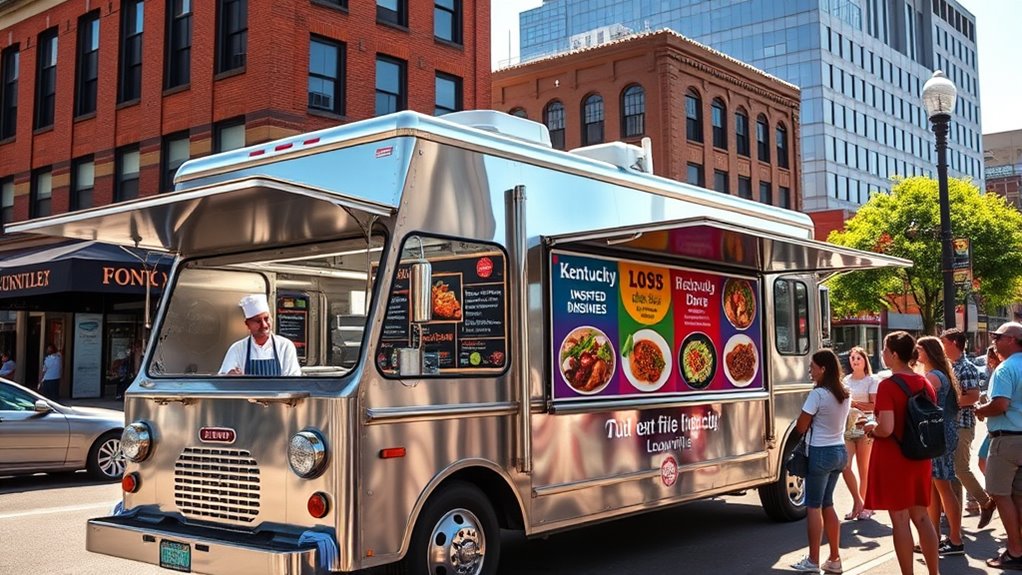
When planning your menu, you need to guarantee each item gets approved by the health department and meets safety standards. Proper food handling and storage techniques are essential to prevent contamination and keep your customers safe. Ensuring all equipment is approved and maintained properly is also critical to passing inspections and avoiding violations. Additionally, understanding food safety standards can help you implement best practices for hygiene and safe preparation.
Menu Item Approval
Planning your menu for a food truck in Louisville requires careful attention to food safety standards set by local health authorities. Louisville’s health department mandates prior menu approval to ensure your dishes meet safety and hygiene requirements. You must detail all ingredients, preparation steps, and storage practices, especially for hazardous foods like seafood, dairy, and meats, which need extra scrutiny. Any menu changes after approval require re-submission for review. Your menu must feature items prepared on-site or in an approved commissary kitchen, with proper temperature controls for hot and cold foods. Ingredients and handling methods must prevent cross-contamination and meet allergen labeling laws. Working with an approved plan and a certified food manager guarantees your menu complies with Louisville’s strict health standards, avoiding delays in your licensing process. Proper documentation of your menu and procedures is essential for passing inspections and ensuring compliance. Additionally, understanding merchant services can help streamline your payment processes and improve customer satisfaction during busy service hours.
Safe Food Handling
Ensuring safe food handling is essential when developing your menu for a Louisville food truck, as improper practices can lead to contamination and health violations. You must prioritize hygiene, cross-contamination prevention, and temperature control. To keep your customers safe and your operation compliant, focus on these key actions: 1. Enforce strict handwashing and glove use**—your staff should wash hands for at least 20 seconds and wear gloves when handling ready-to-eat foods. 2. Prevent cross-contamination—use separate cutting boards and tools for raw and cooked foods, and store raw meats below ready-to-eat items. 3. Maintain proper temperatures—keep cold foods at or below 41°F and hot foods at or above 135°F, using calibrated thermometers for accuracy. Complying with local health regulations helps avoid violations and ensures a safe dining experience for your customers. Additionally, regular staff training on food safety standards** is vital to sustain safe practices across operations.
Proper Storage Techniques
Effective storage techniques are crucial for maintaining food safety and maximizing your Louisville food truck’s efficiency. Proper temperature control prevents bacterial growth and spoilage. Keep cold foods at or below 41°F, and hot items above 135°F. Use calibrated thermometers to monitor storage conditions regularly. Organize food by separating raw meats from ready-to-eat items and label containers clearly. Use color-coded utensils to avoid cross-contamination. Manage inventory with FIFO to reduce waste and ensure freshness. Regularly inspect for spoilage and clean storage areas thoroughly. Transport perishable items in insulated containers. Proper sanitation of equipment prevents bacterial buildup and pest intrusion. Design your storage layout for easy cleaning and ideal airflow. Additionally, understanding power consumption can help you optimize energy use in your storage areas, reducing costs and ensuring reliable operation.
Effective Marketing and Community Engagement Strategies
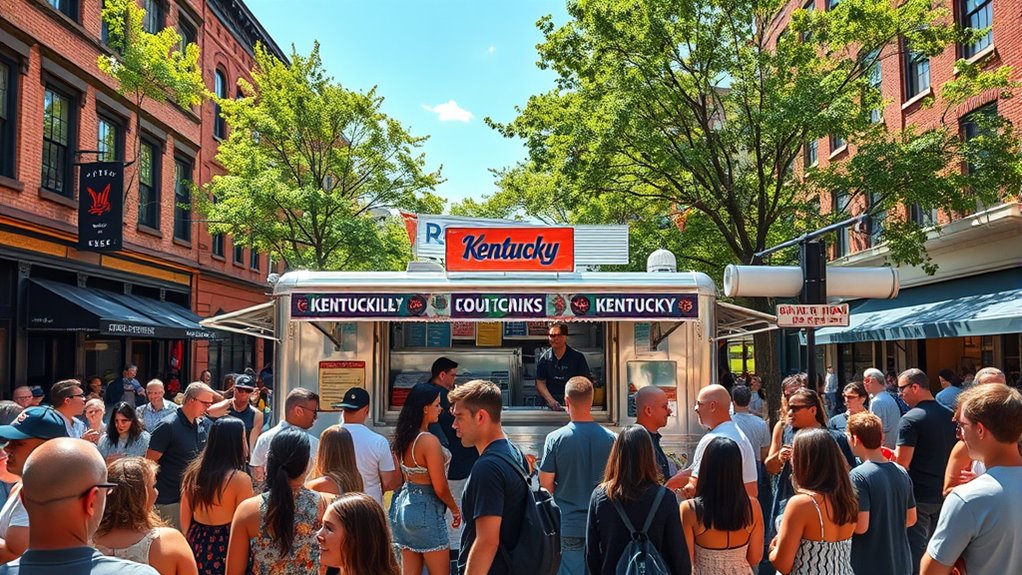
To build a strong reputation and attract a steady flow of customers, your food truck should actively engage with the local community and leverage diverse marketing strategies. Participating in local events like festivals, farmers’ markets, and sports events boosts visibility and creates direct connections with customers. Partnering with nearby businesses such as coffee shops or breweries fosters cross-promotion and expands your reach. Utilizing food truck parks places you in high-traffic spots where customers already gather, encouraging exploration of multiple vendors. Additionally, maintaining active social media accounts keeps your audience informed and excited about specials and events. Online reviews and ratings play a significant role in attracting new customers and establishing credibility for your food truck. Here are three impactful strategies: 1. Join community events and festivals regularly. 2. Build partnerships with local businesses for mutual promotion. 3. Leverage social media to create buzz and engagement. Engaging with community engagement activities like food truck rallies can further elevate your presence and reputation.
Maintaining Operations and Ensuring Compliance
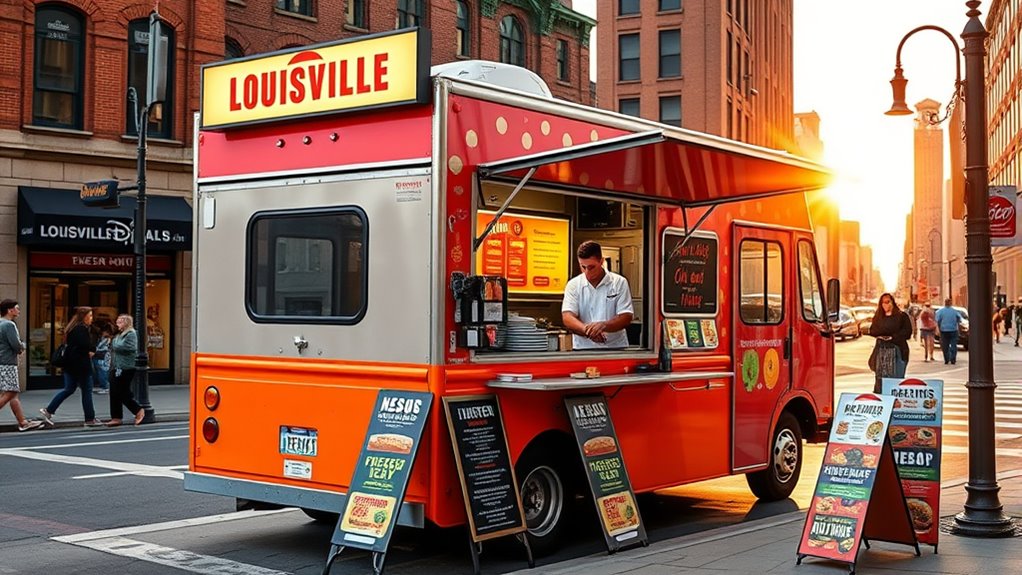
Maintaining smooth operations for your food truck requires strict adherence to various regulations and safety standards. You must obtain and display a Mobile Food Vendor License and health inspection certificate from Louisville Metro Health Department. Completing a Kentucky Food Handler Card course and maintaining certification is essential for food safety compliance. Regular health inspections ensure standards are met, preventing shutdowns or penalties. Equip your truck with necessary sanitary facilities, including handwashing stations, trash bins, and proper waste disposal. Fire safety is vital: install approved hood and suppression systems, keep fire extinguishers accessible, and secure propane tanks upright with leak tests performed regularly. Follow zoning rules, avoid operating near restricted areas, and secure permissions for private lots. Keep all permits current, display them visibly, and retain documentation for inspections. Compliance with local regulations is crucial to avoid fines and ensure your business runs smoothly.
Frequently Asked Questions
How Long Does the Permit Approval Process Typically Take in Louisville?
The permit approval process in Louisville usually takes about 2 to 6 weeks. You should submit a complete application early and monitor its progress via the Louisville Metro Business Portal. Keep in mind, during peak seasons or if there are delays with inspections or documentation, it might take longer. Ensuring all requirements are met and staying in touch with the permit office helps speed things up.
Are There Specific Health Inspection Schedules for Food Trucks in Louisville?
You’re wondering about the health inspection schedules for food trucks in Louisville. Typically, your food truck will undergo routine inspections once a year, with some facilities inspected every six months. The initial inspection happens before you start selling, ensuring compliance. If violations occur, inspections may be more frequent. Louisville uses a risk-based approach, adjusting inspection frequency based on your compliance history and potential safety concerns.
Can I Operate a Food Truck in Louisville Without a Commissary Kitchen?
You wonder if you can operate a food truck in Louisville without a commissary kitchen. Generally, Louisville requires food trucks to use an approved commissary for food prep, storage, and waste disposal to meet health and safety standards. Operating without one can make passing inspections difficult and may lead to violations. It’s best to coordinate with the Louisville Metro Health Department to see if any exemptions or alternative plans are available for your specific situation.
What Are the Restrictions on Operating Hours for Food Trucks in Louisville?
Your curiosity about Louisville’s food truck hours is like asking if the sun rises every morning—you need to know! You can operate from 7 a.m. to 11 p.m. daily, but only if you follow strict rules. Stay at least 150 feet from residences or competitors and avoid operating during restricted hours near sensitive zones. Break these rules, and you risk fines or losing your permit, so stick to the schedule!
How Do I Handle Permit Renewals and Updates in Louisville Annually?
For permit renewals in Louisville, you need to track your expiration date, usually sent 60 days early, and submit your renewal application on time. Update all business info, including ownership or name changes, and pay the required fees—around $150 to $280. Be prepared for inspections, like health and fire safety checks, and guarantee your certified food manager status remains current. Pay online to avoid penalties or lapses.
Conclusion
Starting your food truck in Louisville is like planting a seed—you need the right permits, location, and menu to help it grow. With careful planning and community engagement, your truck can become a beloved local fixture. Just remember, even the busiest trucks started with a single step. Stay compliant, adapt to feedback, and watch your passion turn into a thriving business that feeds both your dreams and your city’s appetite.
